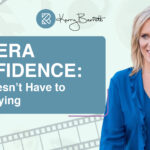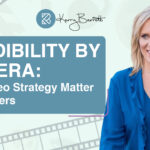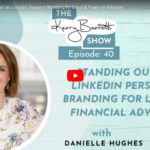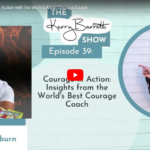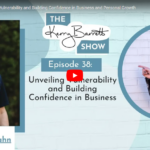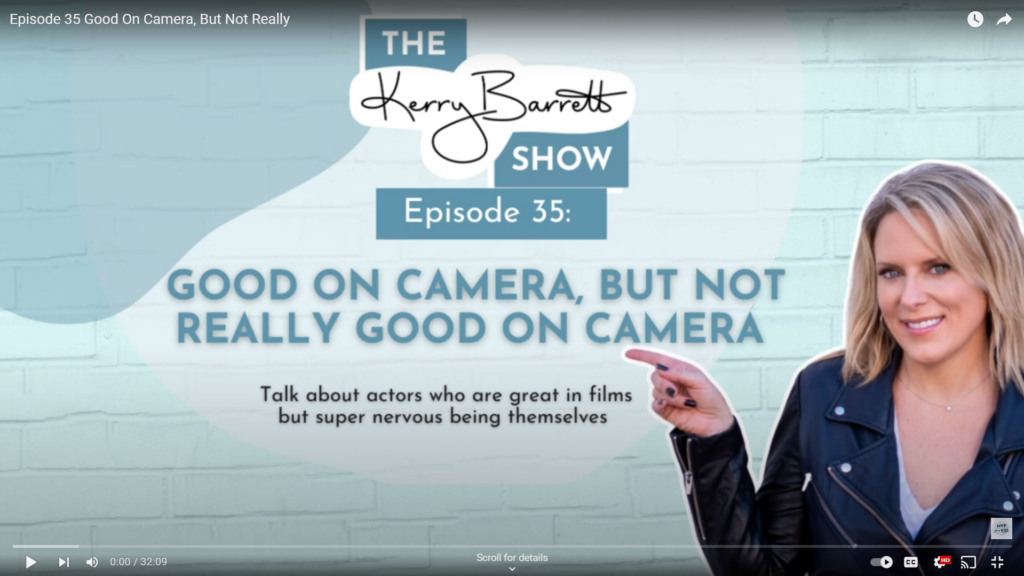
Ever wondered why some actors captivate audiences on screen but grapple with anxiety when they step out of character? Don’t miss out on our insightful discussion as we delve into this fascinating topic.
🔍 WHAT TO EXPECT:
-Discover the reasons behind actors’ nervousness in real life despite their on-screen prowess.
-Hear personal stories and experiences.
-Gain valuable tips and strategies for managing off-camera anxiety.
-Explore the intricate relationship between performance and personal identity.
Whether you’re a fan of film and television or simply curious about human behavior, this episode promises to offer valuable insights into the fascinating world of actors’ off-camera jitters. Tune in to The Kerry Barrett Show and join us as we demystify the actor’s experience!
Transcript
Kerry:
Welcome to the Kari Barrett Show, the go to podcast for leaders. Are you a founder, executive, or part of a dynamic team? Then you’re in the right place. I’m Keri Barrett, your on camera confidence, public speaking, and delivery coach. Each week, we dive into practical tips, insightful interviews, and engaging stories to help you communicate with confidence and lead with impact. Whether you’re in the boardroom or on the physical or digital stage, this podcast will help you elevate your presence. Let’s get started. Today’s topic may not necessarily seem like it’s entirely relevant to what you do, but the concept is certainly relevant. So here’s the premise.
Kerry:
I’m gonna ask you a question. You ever wonder what Nicole Kidman, King Kim Basinger, Brad Pitt’s another one, Shania Twain, Harrison Ford, What do they all have in common? And they’re all household names. Right? So they have these fantastic careers. They have had insane success as a list stars, but they all share something that is very human. And and, no, it’s not their amazing good looks either, but it is stage fright. Yeah. They’re all afraid to be seen. Now, there’s a little bit of give and take when it comes to the A list actors that we’re talking about and what it is that they are actually afraid of, and that’s what we’re going to be diving in today.
Kerry:
So these folks that I mentioned, and there’s a few others that we’ll talk about during the podcast, they’re pros at slipping into their characters, right, when they’re actually up on the silver screen. That, they’re fine with. They have these characters or they have alter egos, if you will. We’ve all heard about Beyonce’s. Tina Fey has one as well. But when it comes to being themselves, like, on a talk show, for example, or doing an interview with someone, that is an entirely different ballgame. Not for everybody, but for the names that I mentioned, and there’s a few others that are in there as well. Before we get to all of that, I’m Kari Barrett.
Kerry:
I’m your guide to leveling up your visibility and nailing those virtual and presentation skills. This is whether you’re leading the boardroom or commanding the courtroom. So let’s dive a little bit further into this whole sort of paradox. When we think about showing up, when we think about speaking in public, there is a really interesting puzzle that even, like, the best of stars and the most of the list of listers struggle with. And it’s not about flubbing lines. It’s not about missing a cue or missing their mark on the set. It’s about what they describe as this sort of raw terror that comes with being utterly and vulnerable, that’s the word that I’m trying to say, in front of a live audience without that sort of armor as their character or their alter ego. And that is something to a great degree that we all feel.
Kerry:
Now we may not feel it as extremely as they do, but whether we are stepping onto a stage or just presenting our ideas in a meeting, right, we feel that sort of vulnerability, and it’s called stage fright. Most people hate public speaking, and the same applies to getting on camera. But here’s the kicker to all of that. Overcoming that fear is not about walling yourself off. It’s not about dodging your vulnerability. It is in fact about embracing your vulnerability, and that’s part of what we are going to be talking about today. There is a lot that goes along with that. It may seem like it is somewhat simple, but it actually isn’t.
Kerry:
It’s about embracing this with the fear that goes along with it. Right? We all have this sort of internal argument with our egos. Our egos are designed to keep us safe, but they ultimately put up a wall and they prevent us from doing things. And then when we do step onto the stage, the ego prevents us from doing it, many of us. Right? It’s not about being timid. We can’t be timid. That’s usually what our ego tells us to do. Don’t attract attention.
Kerry:
But it’s about jumping in with both feet and recognizing in the process of doing that, that being seen is scary, but it’s also very powerful. There’s so many high visibility ways that you can drive client awareness and business development and personal branding, and you can create a whole bunch of opportunities for yourself and your business. But this idea of being ourselves is actually what it is that connects us to our audience. Along with understanding your audience and what their issues are and their pain points, understanding that. But being yourself is also what draws us to them and them to us and us to one another. So that leads me to something that is called the actor’s paradox. It is so common that there’s actually a term for it, and it’s what all of those people that I mentioned still struggle with. Excuse me while I get a little sip here.
Kerry:
The actor’s paradox is the balance between that ego and being vulnerable. It’s the balance between humility and putting yourself out there, self esteem. The paradox, the actual paradox, right, the crux of this is that in addition to humility and being free from an ego that drives your decisions, and we all have one even if we don’t think we do, the actor in this case, right, and this applies to you, has to develop enough self esteem to be able to deal with the mountain of rejection that he or she is going to face in the business. And this is applicable to you as well. Because just a very ego driven actor or actress never fully realizes their creative potential, those overly sensitive actors and actresses also never realize necessarily their business potential. They get depressed. They develop a negative defensive mindset, and that’s the ego at work designed to insulate them from rejection. So they shrink from showing up and it dulls their ambition.
Kerry:
It kills the forward momentum in their careers, and this is where it applies to you. So I’m gonna take a real world example. And I want you to imagine for a second, close your eyes if you need to, imagine for a second stepping into the shoes of one of the people that I mentioned before. Right? Somebody who is celebrated for being amazing in their character acting, and also somebody who is entirely terrified of being themselves when they are in the spotlight. So the next name that I’m going to mention is Emma Watson. And if you have watched any of the Harry Potter movies, you know exactly who I’m talking about. She basically grew up on the screen. Right? She now has surpassed her status as an actor.
Kerry:
She is a UN woman goodwill ambassador standing up for gender equality. She’s had to navigate that transition from being an actor to being a public advocate, if you will. And despite the fact that she is amazing when she steps in front of the camera, speaking out on some of those issues that are really close to her heart was a whole new kind of challenge because aside from being herself, she’s also talking about something that’s important to her, a personal, if you will, vulnerability. So her story shows that there really is power in aligning your public presence, if you will, with what it is that is your purpose, your convictions, your passions, if you will. And this is a thought that is equally applicable to all of us and myself included. I don’t leave myself out of this at all, but Emma’s initial hesitation is probably a good word to describe it. To speak publicly reminds us that we’re not alone. We all deal with that.
Kerry:
And that realization can be incredibly freeing because when you see somebody up on the stage and when you see somebody in front of the camera or on the news talking about their subject matter expertise, they’re all struggling with that. They have just figured out how to do it with the struggle. And the rejection, which inevitably comes, is something that they’re able to compartmentalize. So it’s not about doing this without any fear. I wanna be clear about that. It’s about moving through it. And one of the things that’s key to remember as you’re talking about that is that your audience, no matter where you are, they’re more on your side than you might think. They want you to succeed because they’re there.
Kerry:
They’re watching. And when you bring all of that stuff together, you can turn with practice. It doesn’t come right away. There’s certainly a mindset that’s involved here. We talked a little bit about performance mindset on last week’s episode. But when you bring all of this together, you can turn public speaking from being a source of strict anxiety and something that you do not do to a meaningful platform for connection, certainly, but also advancement in your career, leadership, visibility opportunities, selling opportunities, business development, client awareness, etcetera. Okay. So now we’re gonna talk about some of the tactics or tips that you can use to move forward.
Kerry:
What is your path? Right? So we’re gonna be looking at you right now, and I should point the crooked finger as well because this applies to me. So a lot of my clients, most of them in fact, dread public speaking. They definitely don’t do public speaking, but they also dread public speaking. And they have avoided it as much as they can during the course of their career, and it has hamstrung or handicapped many of them. And even if they have succeeded, they have succeeded despite that fear, and there is more opportunity beyond it. So at the core of this fear is for many of us, and it certainly applies to this actor’s paradox concept that we’ve talked about, is that it’s being seen for who you are without a character to shield you. So you get up on the stage or you start to record a video. Like, I say this to myself every time I get up in front of a camera.
Kerry:
I said it to myself before this episode. I’m saying it to myself now. You’re so dumb. You’re ruining a brand. Why are you doing this? Why are you getting up in front of people? But here is a mindset shift for you. Realizing that even the most esteemed actors and actresses, the most admired celebrities share these same fears. It’s not again so much the absence of that fear, but how we move forward despite that and understanding that vulnerability is a universal experience. Right? The top CEOs, the big names, the household names, they all experience that.
Kerry:
So it’s not really a flaw. And if you understand that, it becomes a lot easier. You’re starting to think about the audience instead of yourself, and that radically changes how we approach public speaking, getting in front of a camera, etcetera. So a key tip for easing into public speaking, if you’re gonna take sort of small baby steps, is do it with a supportive audience where the stakes are lower. So perhaps that means sharing something that is personal or important to you. This particular tactic doesn’t just build comfort with speaking. It builds confidence in your message and it builds confidence in your voice. So something that I suggest doing to implement that practice is just opening up your phone and riffing into it every day for 30 to 60 seconds.
Kerry:
And as you get more comfortable, you can expand. But look at this side of the lens, not this side of the lens, so that you don’t get distracted and riff about something. It doesn’t have to be about work at all. It can be about your personal life, something you’re doing that night, I don’t know, the coffee that you are looking forward to getting in the morning, whatever it is, just because that is the very low stakes, opportunity or situation. You don’t ever have to post that. You don’t ever have to publish it, but you can begin to talk about things that are personal to you and get more comfortable doing that in front of a lens, and then ultimately, of course, in front of a stage or on a stage as well. Alright. So now we are going to talk about how you move beyond the fear and you start to develop some very personal or authentic ways to express yourself.
Kerry:
So right now, we’re gonna get into the heart, if you will, of turning public speaking, and I wanna be clear. When I say public speaking, I’m talking about anytime you are in front of an audience. So that means a webinar. That means a virtual or hybrid event. It means an in person event. It means creating videos or doing live streams or podcasts. It means media opportunities. It means all of those things.
Kerry:
It could mean a client pitch or an investor pitch. So when I say public speaking, I’m using that as a catchall phrase to apply to all of those opportunities for visibility and client awareness. So when we get into the heart of taking public speaking from this nerve wracking experience or this thing that you absolutely want to avoid at all costs And when you’re able to turn it into an opportunity for growth, it is fascinating how stories from people like Emma Watson, like Nicole Kidman, like Harrison Ford, and, yes, many of my clients, many of you who’ve messaged me or emailed me and are looking for help, it is a universal journey, if you will, for all of us who are embracing who we are and being comfortable sharing it. So I want you to imagine this. Imagine that public speaking is not this big scary monster. It is actually a chance, a golden chance, a great chance to share what is true to you and connect with others who probably feel exactly the same and to grow from each one of those steps that you take. So that’s a shift in perspective that takes you from dreading this opportunity and hindering your growth to embracing it. Right? Your audience isn’t there to see you fail.
Kerry:
They’re actually rooting for you. So how do you move from that fear to being able to be yourself? Of course. We say this all the time. I say this all the time. I beat this drum every single day, but I know most do not do it. And it’s practice and preparation. That is it. Now, yes, there are absolutely skills that go into being a great presenter or great on camera or great on the stage.
Kerry:
There is skill development. It’s not just about practicing with whatever skills you have. It is about actually developing those skills and then deploying them and executing them. But if you’ve got pre stage jitters and you have practiced, it’s time to step into the spotlight, a little bit of mindfulness. A couple of deep breaths can help you focus on what is important here. For example, I’m incredibly self conscious. I always have been, but I’ve learned to compartmentalize that for the most part. Or if I can’t, if I start to deviate when I’m speaking, I’ve learned to put it aside as I’m speaking and continue on.
Kerry:
So what are the hands on strategies that help you with that outside of practice and preparation? Butterflies. Let’s talk about those. Because they’re not only signs of nervousness, they’re also signs of excitement. Right? That adrenaline rush that you feel, maybe it doesn’t hit until you’re off the stage and you’re in a safe space again, but that stuff is your body gearing up or recognizing that you’re sharing something that’s really cool, that’s really important, that will help you and help the audience, and visualization when you have those sort of prestage or prespottlight jitters. Picturing a successful talk or a successful livestream or podcast or webinar or whatever it is. Something that your audience is right there with you in, and they’re nodding and they’re smiling. Visualization is a game changer. By the way, this doesn’t just apply to speaking.
Kerry:
We know that visualization applies to so many opportunities and situations in both our personal and professional life. So knowing your stuff, obviously, is crucial. You gotta know it inside out. You gotta know it like the back of your hand. Knowing that you know exactly what you’re talking about is a huge confidence booster. Right? It’s like a quick shot of adrenaline. And practice is not just about getting everything right. There is skill development, as I mentioned, but it is also to a large degree about getting comfortable.
Kerry:
So I mentioned opening up your phone and talking for 30 to 60 seconds every day. Do that for 30 days and pick one thing to work on, let’s say, for the first 5 to 10. And maybe it’s energy or maybe it is the rate at which you speak or your vocal variety. Pick one thing and then work on it. You will hear people say that you should practice in front of a mirror. I think that’s a terrible idea because not only are you trying to deliver, you’re also trying to critique yourself at the same time, and that is a recipe for getting entirely in your head and actually making things worse. If you have a trusted friend that you can practice in front of to get some real time feedback, that’s great. However, recognize that it also has the potential to go sideways, and the reason is that speaking is very subjective.
Kerry:
It’s not a science. It’s not 1 +1 equals 2. And so you might do something that is actually great for the audience to whom you’re planning to deliver this particular presentation to. But to your friend watching without the skill set to really understand what all the elements are that come together, what all the gears are to make something work when you’re up on stage or in front of a camera, they too can turn things sideways, and you can get in your head. So my best suggestion for you there is if you’re not gonna hire a coach, you should just practice in front of your phone. And in fact, even if you hire a coach, you should practice in front of your phone. Also, developing a little ritual before you get in front of the lens or you step up on the stage works as well. So maybe it’s a couple of deep breaths.
Kerry:
Maybe it’s a quick walk around the building or around your office or house or whatever it is. Maybe it’s a song that gets you pumped up. I know this sounds generic, and you’re like, oh, is that really gonna help me? But I do want you to try it because when you eventually create this connection between whatever that activity is and what comes next, your brain will also tell you, hey. We’ve got this. Right? I understand what these activities mean, and I understand what’s coming next, and I can bring those two things together to make the end result even better. And that is something that takes a while to do, but it is absolutely possible. We all have the ability to do this. I think that’s one of the things that we struggle with.
Kerry:
We wonder if we have the ability, and you do. I promise you do. If I do, you do. When you’re in front of the lens or you are in front of the stage, there’s a couple of things to remember there as well. And a lot of us get really caught up in the perfection thing. It’s not about that. If you stumble, it’s fine. If you mispronounce a word, heck.
Kerry:
I’ve already done that, like, 10 times on this livestream. That’s okay. All of that stuff is human. Pausing, if you need to regroup your thoughts, that’s fine. It’s actually powerful. It can be. Rather than filling it with umms or ahs or just stuttering and moving on, gives you a moment to gather your thoughts and and your audience, in fact, a chance to digest what you’ve said. I know pauses, they seem forever.
Kerry:
In fact, in the news industry, we used to call them the pregnant pause. It’s like that pause that lasts for a little while, and you hear silence, dead air, if you will, and it sounds like it feels like it’s taking forever for the next word to come out. That can actually be a really powerful moment. And recognize that when you’re in that moment, it always feels a whole lot longer and a whole lot worse than it actually is. So the next thing to talk about is eye contact. And when you’re able to do that, you can turn a speech, even if it’s in front of an audience of 1,000 in person, you can turn it from a monologue into what actually feels like a conversation. Same thing applies if you’re on video. You always wanna feel like you’re talking to one person and recognizing that one person is replicated all over.
Kerry:
But if you’re just talking to one person, not only is that a mindset shift, but it makes it a little bit easier, and it makes the whole experience a little more personal rather than just, like, unidirectional dumping of information. I guess what I wanna say here is that in the long run, facing your fear in these sort of small manageable steps, looking for constructive feedback, getting a coach, if you will, all of that not only uplevels your skills and brings you to your end goal more quickly, but it diminishes the fear factor. And if you find that anytime you get up on a stage or you, you know, speak in front of a camera, that fear is cramping your style. It’s not at all how you wanna be in front of people. I’m gonna say that sometimes there is a deep seated fear that has to do with some sort of trauma or something that happened to you. In fact, most of our ego driven decisions are based on either a reptilian brain or some sort of trauma that we experienced in the past that we’re now looking to stay safe from. So I’m not a therapist. I’m a big advocate of them, though.
Kerry:
If you find that this is more than just a mindset shift or skill development, then maybe that’s something that you might want to consider to tackle some of those anxieties head on. And I will tell you, it is absolutely possible to to tack them on. As I mentioned before, I’m terribly self conscious. I used to be not only terrified, but really quite awful at speaking on a stage or in front of a lens. So I know if I can do it, you can do it. Right? You have the ability. I promise you. And so even if big names like the ones we’ve been talking about, Emma Watson, Harrison Ford, even if they haven’t really gotten over their fear of public speaking and let’s be very clear about it, that fear is judgment, rejection, failure.
Kerry:
If I do any of those things or experience any of those things, it’s going to confirm all of the horrible things that I’ve ever told myself about myself. Right? That’s generally where that fear lies. And sharing something that’s very personal in a very personal sort of way, again, because speaking is not just science, it’s art. So it is. It’s like music or a painting or a sculpture. It’s a very personal thing to share, and that makes it scary as well. You’re not just getting up there and or you’re not just writing a white paper with data and statistics. That’s not scary, right, in the way that that is, and it’s because it’s so personal.
Kerry:
And unless we tackle it head on and we look at where that fear stems from, we don’t realize how much we are handicapping ourselves by not tackling it. So those folks, again, once I mentioned before, Harrison Ford, Nicole Kidman, Shania Twain, they still have all of that fear. They’ve just learned to push through it because they’ve developed techniques to compartmentalize it, and they’ve also developed skills. So even if they are incredibly scared of being themselves on the talk show, they still know how to deliver, and they can fall back on that, sort of putting the skills on autopilot, and then you’re able to focus on the other stuff. So longer term strategies, I mentioned certainly getting a coach, obviously, recording and watching yourself. Exposure therapy is basically where you are, at least in the context of public speaking, you’re gradually exposing yourself to public speaking situations. So, again, as I mentioned, starting with really low stakes environments, progressively working up to things that are larger or perhaps a little more formal. Again, higher stakes.
Kerry:
Consistently doing that, constantly exposing yourself desensitizes you to fear. That’s what the news did for me. I had to be on air every day, and so I was able that’s exposure therapy. It’s also learning about the job. And there were lots of mistakes that I made, but it’s exposure therapy, and it makes that fear more manageable. So in sum, what I want you to take away from today’s episode is that the fear of public speaking is getting over it, specifically. It’s something that is mindset and changing making shifts there, but also it’s practical strategies. Right? So things you do before, during, after.
Kerry:
It’s skill development. It’s practical things, tactical things that you do every single day, and you are gradually getting better at them, and you’re gradually becoming more comfortable, but you’re not ever gonna fully get over it. And I wanna make that very clear, and that’s perfectly fine. Emma Watson, Harrison Ford, all the others I mentioned, they never fully got over it either. They just had the skills to deliver, and they had the skill set to be able to push through in those moments. I hope all of that made sense. I realized that we talked about a lot today, and I certainly know that as this was progressing, as we were discussing the actor’s paradox, if you will, it became more relevant to you. And you understand where you can bring in those strategies and how not tackling them actually really does hamstring you to a great degree in your ability to progress in your career.
Kerry:
Alright. Coming up next week on the Keri Barrett show live, developing a performance mindset. Right? This is one of the biggest shifts that people need to make. When you’re speaking, you are not just a deliverer of information. You are performing it. Every time you’re in front of an audience, you are giving a performance. So your audience is captivated. So I’ll give a quick example.
Kerry:
You’re hosting a webinar. It is, let’s say a sales webinar, and you’re looking to bring people not only to the webinar, but then also keep them in their seats throughout it. Because the real challenge is not just getting there, but keeping them there. And if you are awkward or uncomfortable or, oh my god, if you’re boring, you might as well just give it up. Hang it up. You have to be a performer. Right? That is a huge mindset shift for most people, especially if you’re in a more stoic or traditional industry, if you are in finance, if you are insurance, if you are in the legal industry, if you’re a high level executive in a larger corporation, That is a huge shift for most people. And for me, very quickly, before we wrap this up, in the news industry, I realized about 6 months in that I was just a deliverer of information, and I wasn’t actually keeping my audience captivated.
Kerry:
And that’s when real changes started to happen for me. So understanding that difference and how to move into that mindset is what we are going to be tackling next week, again, same time, same place. By the way, before we wrap this up, if you are interested in scheduling a free confident speaker strategy call, you can do so using my booking link, calendly.com/karybarrett, competent on-camera strategy call. If you are listening to this podcast, you will find the link to that in the show notes. And if you are watching us here live, joining us live, I will put that link in the comments. Thank you for joining me, and I hope that you have a spectacular day.
